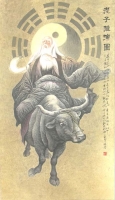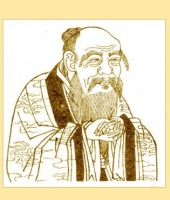| 名: | 李耳 | ||||
| 字: | 伯阳 | ||||
阅读老子 Lao-Tzu在百家争鸣的作品!!! 阅读老子 Lao-Tzu在诗海的作品!!! | |||||
老子的思想主张是"无为",老子的理想政治境界是“邻国相望,鸡犬之声相闻,民至老死不相往来”
《老子》以“道”解释宇宙万物的演变,以为“道生一,一生二,二生三,三生万物”,“道”乃“夫莫之命(命令)而常自然”,因而“人法地,地法天,天法道,道法自然”。“道”为客观自然规律,同时又具有“独立不改,周行而不殆”的永恒意义。《老子》书中包括大量朴素辩证法观点,如以为一切事物均具有正反两面,“反者道之动”,并能由对立而转化,“正复为奇,善复为妖”,“祸兮福之所倚,福兮祸之所伏”。又以为世间事物均为“有”与“无”之统一,“有、无相生”,而“无”为基础,“天下万物生于有,有生于无”。“天之道,损有余而补不足,人之道则不然,损不足以奉有馀”;“民之饥,以其上食税之多”;“民之轻死,以其上求生之厚”;“民不畏死,奈何以死惧之?”。其学说对中国哲学发展具深刻影响,其内容主要见《老子》这本书。他的哲学思想和由他创立的道家学派,不但对我国古代思想文化的发展,作出了重要贡献,而且对我国2000多年来思想文化的发展,产生了深远的影响。
一说老子即太史儋,或老莱子。《老子》一书是否为老子所作,历来有争论。
《史记.老子韩非列传》:"关令尹喜曰,子将隐矣,强为我著书。于是老子乃著书上下篇,言道德之意五千余言而去。"汉河上公作《老子章句》,分为八十一章,以前三十七章为《道经》,后四十四章为《德经》,故有《道德经》之名。但1973年长沙马王堆三号汉墓出土的《老子》抄写本,《德经》在《道经》之前。道教奉为主要经典之一。
在卷帙浩繁的中国书海当中,有一卷薄而又薄可能在国外拥有最多的译者和读者的书,这本书名叫《老子》或《道德经》。《道德经》是解释道教哲学的主要经文。
这是一本微妙费解的书,文笔极其隐晦,可有许多不同的解释。“道”这个主要概念通常被译为“方法”或“道路”。但是这个概念有点儿含糊其辞,因为《道德经》本身一开始就说:“‘道’,说得出的,它就不是永恒不变的‘道’;‘名’,叫得出的,它就不是永恒不变的‘名’。”①但是我们可以说,道的大体意思是 “自然”或“自然法则”。
道教认为,人不应该与道作斗争,而应该服从道,按照道来办事。积极追求得到权力或积极寻求行使权力,与其说是不道德的倒不如说是愚昧无知和徒劳无益的。道是不可消灭的,人们在生活中应力求顺道而行。一个道教徒可能会指出水是无限柔软的,它驯顺地流向最低点,甚至对最弱的力也不加抵制,但是它却是不可毁灭的,而最硬的岩石是最终会被磨掉的。
对个人来说,通常应提倡纯朴和自然,应避免使用暴力,如同避免一切追名逐利的行为一样。人们不应该寻求改造世界,而应该尊敬世界。对政府来说,稍有消极的政策通常也是最英明的政策。规章繁冗,通过更多的法律或严厉施行旧法律通常会使事情弄得更糟。高税赋,雄心勃勃的政府计划和发动战争,这一切都是与道教哲学的精神背道而驰的。
按照中国的传说,《道德经》的作者是一位名叫老子的人。据说他是孔子的同时代人,但比孔子年长。孔子生活在公元前六世纪,从《道德经》的内容和风格上来看,没有几个现代学者认为它是这么早期的作品;有关该书的实际创作日期问题,存在着许多争论(《道德经》本身未提到一个具体的人物、地点、日期或历史事件)。但是公元前320年是一个靠得住的估计──与实际日期的误差在八十年以内──也许比这个误差范围还要小得多。
这个问题引起了对有关老子其人的生卒年及甚至对有关其人的真伪的许多争论。有些权威相信老子生活在公元前六世纪这个传说,因而断定他没有写《道德经》。其他学者指出他只不过是传说中的人物。我个人的观点仅为少数学者所接受,我认为:(1)老子实有其人,是《道德经》的作者;(2)他生活在公元前四世纪;(3)老子是孔子较年长的同时代人的传说纯属虚构,是后来的道教哲学家为给老子及其著作涂脂抹粉而编造的。
值得注意的是在早期的中国作家当中,孔子(前551—479)、墨翟(前5世纪)和孟子(前371—289)既没有提到老子,也没有提过《道德经》;但是庄子──一位公元前三世纪誉满全国的道教哲学家却反复地提到过老子。
由于甚至对老子的存在都有争论,我们对他的生平详情就应该持怀疑的态度。但是下列的说法有很多的出处:老子诞生和生活在中国的北方;他在一个时期里很可能在国都洛阳当过历史学家或在朝中任守藏室的史官;老子不是他的原名而是一个尊称,大体意思是“大师”;他结过婚,有个儿子,叫聪;聪后来成为魏国的将领。
虽然道教开始时基本上是一种非宗教哲学,但是却最终由此掀起了一场宗教运动。然而虽然作为一种哲学的道教继续以《道德经》中所表达的思想为基础,但是道教不久就被芸芸众生的迷信信念和习惯所囊括,这些信念和习惯相对说来同老子的说教没有什么关系。
假定老子实际上是《道德经》的作者,那么他的影响确实很大。这部书虽然很薄(不到六千中文字,因此足以用一张报纸登载),但却包含着许多精神食粮。整个系列的道教哲学家都用此书来作为他们自己思想的起点。
在西方,《道德经》远比孔子或任何儒家的作品流行。事实上,该书至少出版过四十种不同的英文译本,除了《圣经》之外远远多于任何其它书籍的版本。
在中国,儒教大体上是占统治地位的哲学。当老子和孔子的思想之间出现鲜明的对立时,中国人大都遵从后者。但是老子大体上深受儒家弟子的尊敬。况且在许多情况下,道教思想直接被儒教思想所吸收,因此对数以百万计的自称非道教徒的人都有影响。同样,道教对于佛教哲学,特别是对禅宗佛教的发展有着显著的影响。虽然今天没有几个人自称是道教徒,但是除了孔子以外,再没有哪一位中国哲学家对人类思想的影响象老子那样广泛和持久。
There are many popular accounts of Laozi's life, though facts and myths are impossible to separate regarding him. He is traditionally regarded as an older contemporary of Confucius, but modern scholarship places him centuries later or questions if he ever existed as an individual. Laozi is regarded as the author of the Dao De Jing, though it has been debated throughout history whether he authored it.
In legends, he was conceived when his mother gazed upon a falling star. It is said that he stayed in the womb and matured for sixty-two years. He was born when his mother leaned against a plum tree. He emerged a grown man with a full grey beard and long earlobes, which are a sign of wisdom and long life.
According to popular biographies, he worked as the Keeper of the Archives for the royal court of Chou. This allowed him broad access to the works of the Yellow Emperor and other classics of the time. Laozi never opened a formal school. Nonetheless, he attracted a large number of students and loyal disciples. There are numerous variations of a story depicting Confucius consulting Laozi about rituals.
Laozi is said to have married and had a son named Tsung, who was a celebrated soldier. A large number of people trace their lineage back to Laozi, as the T'ang Dynasty did. Many, or all, of the lineages may be inaccurate. However, they are a testament to the impact of Laozi on Chinese culture.
Traditional accounts state that Laozi grew weary of the moral decay of the city and noted the kingdom's decline. At the age of 160, he ventured west to live as a hermit in the unsettled frontier. At the western gate of the city, or kingdom, he was recognized by a guard. The sentry asked the old master to produce a record of his wisdom. The resulting book is said to be the Tao Te Ching. In some versions of the tale, the sentry is so touched by the work that he leaves with Laozi to never be seen again. Some legends elaborate further that the "Old Master" was the teacher of the Buddha, or the Buddha himself.
Laozi is an honorific title. Lao means "venerable" or "old". Zi, or tzu, means "master". Zi was used in ancient China like a social prefix, indicating "Master", or "Sir". In popular biogaphies, Laozi's given name was Er, his surname was Li and his courtesy name was Boyang. Dan is a posthumous name given to Laozi.
During the Tang Dynasty, he was honoured as an ancestor of the dynasty after Taoists drew a connection between the dynasty's family name of Li and Laozi's bearing of the same name. He was granted the title Taishang xuanyuan huangdi, meaning Supreme Mysterious and Primordial Emperor. Xuanyuan and Huangdi are also, respectively, the personal and proper names of the Yellow Emperor.
Laozi's work, the Tao Te Ching, is one of the most significant treatises in Chinese philosophy. It is his magnum opus, covering large areas of philosophy from individual spirituality and inter-personal dynamics to political techniques. The Tao Te Ching is said to contain 'hidden' instructions for Taoist adepts (often in the form of metaphors) relating to Taoist meditation and breathing.
Laozi developed the concept of "Tao", often translated as "the Way", and widened its meaning to an inherent order or property of the universe: "The way Nature is". He highlighted the concept of wu wei, or "do nothing". This does not mean that one should hang around and do nothing, but that one should avoid explicit intentions, strong wills or proactive initiatives.
Laozi believed that violence should be avoided as much as possible, and that military victory should be an occasion for mourning rather than triumphant celebration.
Laozi said that the codification of laws and rules created difficulty and complexity in managing and governing.
As with most other ancient Chinese philosophers, Laozi often explains his ideas by way of paradox, analogy, appropriation of ancient sayings, repetition, symmetry, rhyme, and rhythm. The writings attributed to him are often very dense and poetic. They serve as a starting point for cosmological or introspective meditations. Many of the aesthetic theories of Chinese art are widely grounded in his ideas and those of his most famous follower Zhuang Zi.
Potential officials throughout Chinese history drew on the authority of non-Confucian sages, especially Laozi and Zhuangzi, to deny serving any ruler at any time. Zhuangzi, Laozi's most famous follower, had a great deal of influence on Chinese literati and culture. Zhuangzi is a central authority regarding eremitism, a particular variation of monasticism sacrificing social aspects for religious aspects of life. Zhuangzi considered eremitism the highest ideal, if properly understood.
Scholars such as Aat Vervoom have postulated that Zhuangzi advocated a hermit immersed in society. This view of eremitism holds that seclusion is hiding anonymously in society. To a Zhuangzi hermit, being unknown and drifting freely is a state of mind. This reading is based on the "inner chapters" of Zhuangzi.
Scholars such as James Bellamy hold that this could be true and has been interpreted similarly at various points in Chinese history. However, the "outer chapters" of Zhuangzi have historically played a pivotal role in the advocacy of reclusion. While some scholars state that Laozi was the central figure of Han Dynasty eremitism, historical texts do not seem to support that position.
Political theorists influenced by Laozi have advocated humility in leadership and a restrained approach to statecraft, either for ethical and pacifist reasons, or for tactical ends. In a different context, various anti-authoritarian movements have embraced the Laozi teachings on the power of the weak.
The Anarcho-capitalist economist Murray N. Rothbard suggests that Laozi was the first libertarian, likening Laozi's ideas on government to F.A. Hayek's theory of spontaneous order. Similarly, the Cato Institute's David Boaz includes passages from the Tao Te Ching in his 1997 book The Libertarian Reader. Philosopher Roderick Long, however, argues that libertarian themes in Taoist thought are actually borrowed from earlier Confucian writers.
![老子- 维基百科,自由的百科全书 [编辑] 道教中的老子](http://oson.ca/upload/images11/cache/bd6f091d0f884e90c11c57677b27d48c.jpg)

